Tire rotation spreads the wear and tear evenly, but what happens if you don’t rotate your tires?
This article highlights the unpleasant consequences of failing to rotate your tires and other important things you need to know about tire rotation.
So, let’s get started.
What Is Tire Rotation?
Tire rotation is the regular repositioning of your tires in specific patterns.
It is a tire maintenance routine that requires you to switch the position of your tires from one side of your vehicle to another. It may be from front to rear or side to side.
Whether you plan to do it yourself or at an auto center, below are some recommended tire rotation patterns that you can use:
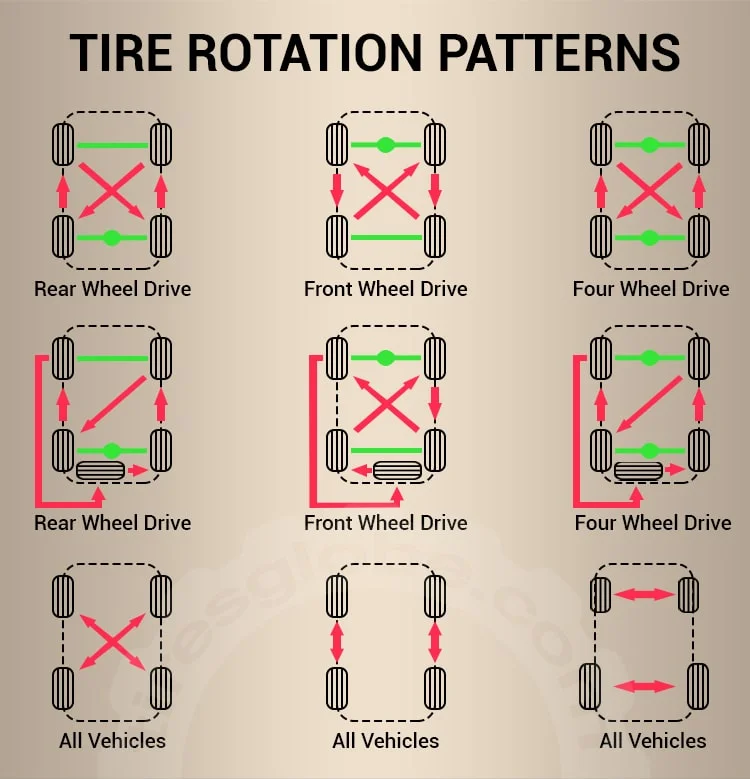
Benefits Of Tire Rotation
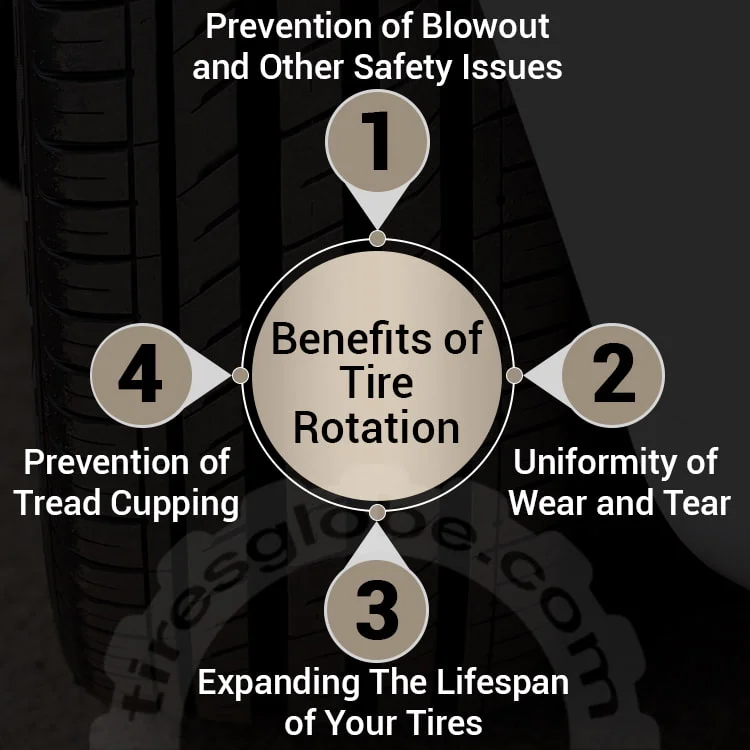
- Uniformity of Wear and Tear
Tire rotation ensures uniformity in the wear and tear of your tires. Usually, the front tires get worn out quicker because they take a more significant proportion of the friction.
Rotating them distributes the impact evenly, so they wear out slowly and last longer.
- Prevention of Blowout and Other Safety Issues
A blowout is the speedy loss of air pressure in a inflatable tire. It is often caused by a poor tire maintenance routine that fails to reveal the tires’ low tread depths, exposed metals parts, and damaged parts.
Rotating the tires helps you notice how low your tire tread depth is and any other maintenance concerns you should be aware of.
- Prevention of Tread Cupping
Tread cupping is a severe out-of-balance condition that causes some tread sections to meet the road more than others. This increases more significant wear in the affected areas.
Rotating your tires frequently can help prevent this severe wear-out condition.
- Optimal Utilization of The Tires
Repositioning your tires will allow you to utilize all the treads at your disposal. The uniform wear will extend how long you can use your tires. It will also reduce how often you need to replace your tires.
What Happens If You Don’t Rotate Your Tires?
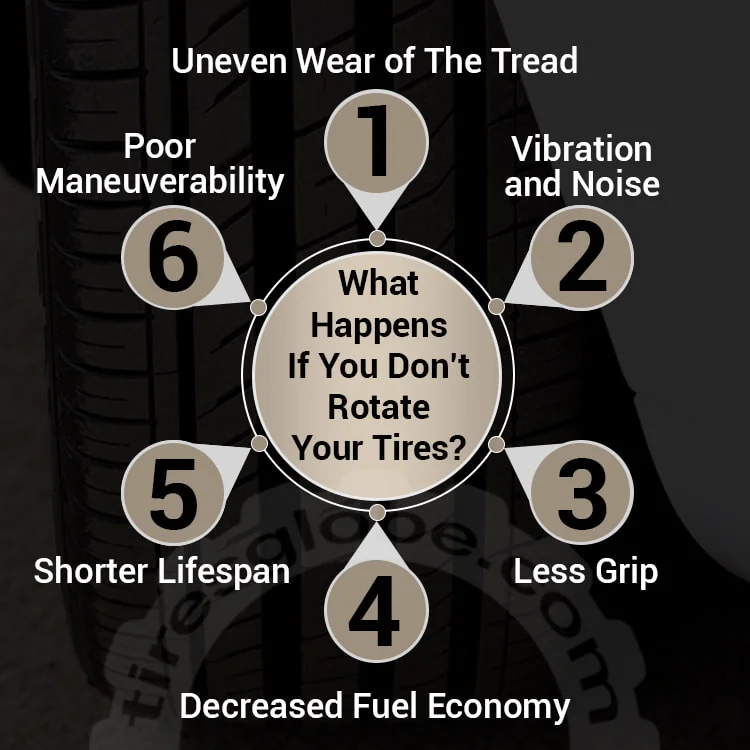
- Uneven Wear of The Tread
Failing to rotate your tires will cause them to wear unevenly. You can expect your front tires to wear out faster because they endure a large part of the friction required for steering, speeding, and braking.
- Shorter Lifespan
You lose out on the extra duration of use you could have enjoyed when you fail to rotate your tires. You get a shorter tire lifespan and less value for the money spent on purchasing them.
- Vibration and Noise
You may experience more vibrations and noise from the uneven tire treads of your car when you don’t rotate your tires. The vibration and noise may be so much that it frustrates the comfort of your ride.
- Decreased Fuel Economy
The unevenly worn-out tires and uneven tread patterns will require extra energy to roll.
This means that you will burn more fuel to supply the energy needed to move your tires. So you may find yourself buying gas more often than you should.
- Poor Maneuverability
Failing to rotate your tires may lead to poor handling of your vehicle. You may find your steering harder than usual. The uneven tire tread may also make it difficult for you to maintain a steady course on the road.
- Less Grip
The uneven wear of your tires may cause your vehicle to have less grip. This can be dangerous, especially on wet roads. Your tires could be spinning powerfully without much difference in the distance covered when you don’t rotate your tires.
You may also experience spinning and repeated sliding in winter conditions because the propelling tires have irregular and insufficient tire treads.
This is a problem that tire rotation can prevent.
How Long Does A Tire Rotation Take?
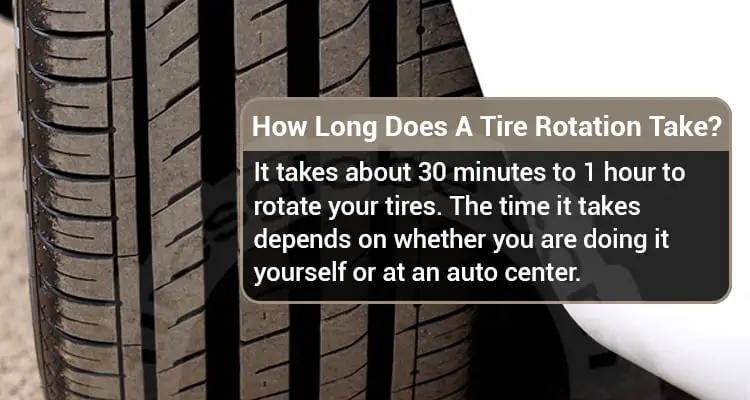
It takes about 30 minutes to 1 hour to rotate your tires. The time it takes depends on whether you are doing it yourself or at an auto center.
Doing it yourself will consume more time than doing it at an auto center. This is because the auto centers use specialized machines to speed up the rotation process. But when you do it yourself, you’ll have to raise the car and reposition the tires one at a time.
How Often To Rotate Tires?
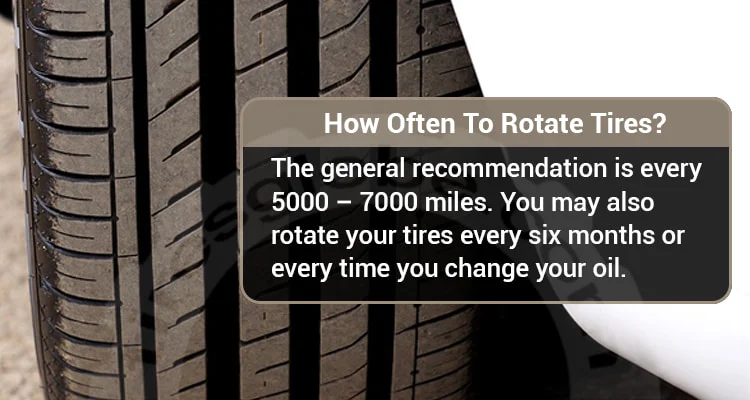
The general recommendation is every 5000 – 7000 miles. You may also rotate your tires every six months or every time you change your oil.
Tire manufacturers may also recommend how often you may have to reposition your tires.
When Not To Rotate Tires?
Although it is essential to rotate your tires, there are times when you should not reposition them.
These include the following:
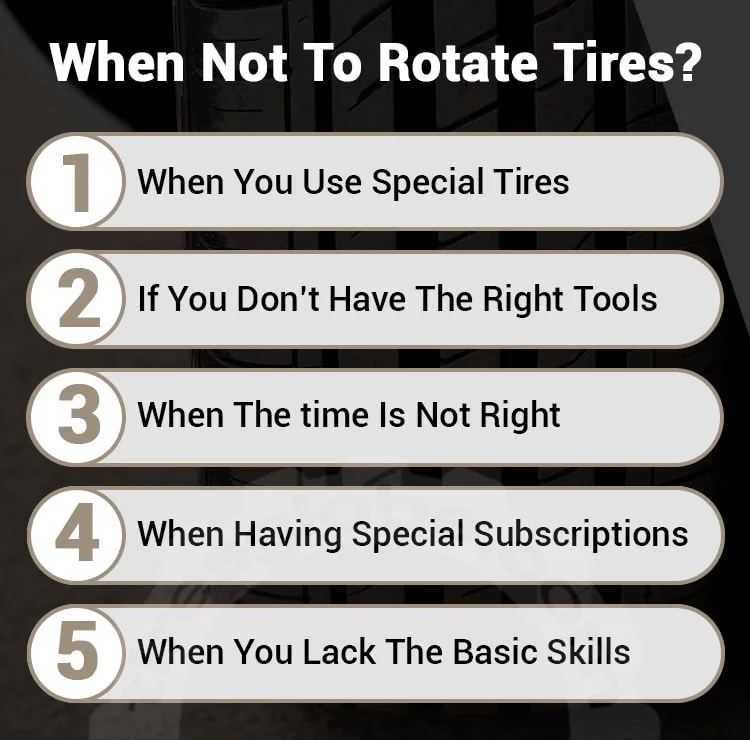
- When You Use Special Tires
The types of special tires include winter tires, trailer tires, temporary spare tires, and All-terrain Vehicles (ATV) or Utility Terrain Vehicle (UTV) tires. These tires are manufactured for specific needs.
Hence you must rotate the tires in a distinct way to maintain their specific tread patterns. Do not rotate these special tires unless you know how to.
If they are not produced for long-term use (as in irregular spare tires), do not bother to include them in the rotation.
- If You Don’t Have The Right Tools
You may use a car jack to lift the car one tire at a time. That may be tiring and time-consuming. However, do not attempt to suspend the car in the air with four separate carjacks at once because you do not have a professional lift. That is dangerous for your vehicle and may put a lot of stress on the jacks.
Do not suspend the car with logs of wood or big stones. That is dangerous, and the hard surface of the stones may damage your vehicle. If you do not have the right tools, do not rotate the tires.
- When The time Is Not Right
You do not have to reposition your tires until six months after the previous rotation.
If you have not used your tires for up to 5000 miles, switching the position of your tires may be unnecessary.
- Special Subscriptions
If you have subscribed to the services of an auto shop where they offer to rotate your tires as a bonus for your patronage, you do not have to reposition them yourself.
- When You Lack The Basic Skills
If you do not know how to jack up a car or remove and replace a tire, you should not attempt to rotate your tires.
If you switch the position of your tires wrongly, you risk an expensive repair later. You also risk the safety of your car and your life when driving.
Conclusion
Evenly distributed wear is critical for the health of your tires and your car. To keep both in good condition, rotating every six months is necessary.
It aids the smooth running of the car and increases fuel economy. You also avoid handling problems when you reposition your tires, and you get value for your money. The benefits are numerous.
If the manufacturer recommends a specific timing for the tire rotation, heed the advice. For your safety, use the right tools.
FAQs:
- How Long Can You Go Without A Tire Rotation?
The answer depends on the type of tires you use. You need to rotate radials and cross-ply tires for even distribution of wear and tear. But you do not have to switch the position of modern tires.
Modern tires are designed with a directional tread pattern. You must fit them on the rim so that the direction of rotation marked on the wall of the tire is observed.
If you rotate them, you may end up with two tires rotating against the bias of the tread. This is as unsafe as driving on excessively worn-out tires.
For radials and cross-ply tires, you can go up to 5000 miles before worrying.
But it’s generally up to you to figure out how urgent you need a tire rotation. The answer will depend on how rough the terrain in your area is.
- What Happens If You Wait Too Long To Rotate Tires?
You will have to deal with rough rides because the maneuverability of your vehicle will become challenging. You will experience violent vibrations during rides which may cause other problems.
Your tires will also wear out faster. This means you will have to deal with the expense of purchasing new tires earlier than you should. That is an expense you could have avoided with a rotation.
Read more: Out Of Round Tire: Causes, Symptoms And How To Prevent
Read more: How Much Does A Tire Weigh? [A List Of Different Vehicles]

